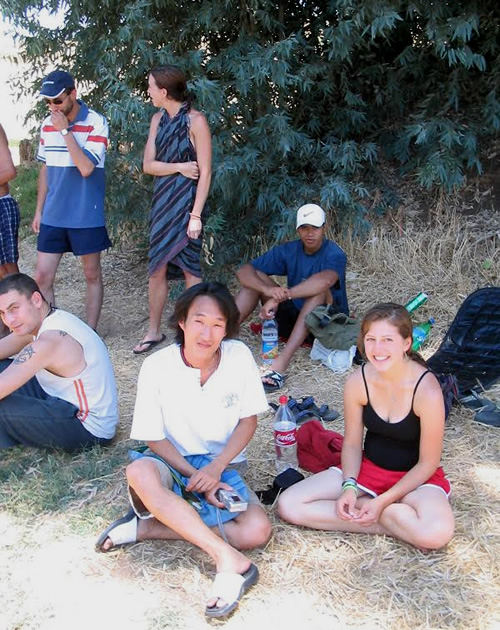How to Volunteer in Israel on a
Kibbutz
Exchange Your Work for Room,
Board, and Companionship
By Bret Scaliter

|
|
A very international group taking a
break from volunteer work at the kibbutz. Photo by Rachel
Trager.
|
Kibbutz is the Hebrew word for group or communal settlement, and kibbutzim (the plural for kibbutz) are rural settlements that immigrants to Israel began establishing just after the turn of the century. Young Jewish pioneers, primarily from Eastern Europe, came to make a new life for themselves and to spread Zionism. By setting up the kibbutzim as outposts, they also strengthened the security of the Jewish community.
Initially rustic farming communities, today there are 270 kibbutzim, varying in size from 80 to 2,000 members each. To their original agrarian base—raising grains, fruits, vegetables, poultry, dairy, and beef cattle—kibbutzim have added various industries, from poultry-packing plants to tourism.
Since hiring paid workers is contrary to the kibbutz principle of self-reliance, many kibbutzim host volunteers in exchange for work.
Who Volunteers in a Kibbutz?
A kibbutz volunteer is a guest of the kibbutz. Marcelo, a volunteer from Denmark, compares the experience to visiting friends in a remote location for a few days and helping them paint their house. You wouldn’t expect a wage, and your friends would handle all your basic needs. To be a volunteer, you do not have to be Jewish. In fact, most volunteers are not.
Ruth Ney, a member of Kibbutz Kfar Hanasi, says, “Life as a volunteer is to find yourself in an organized society where people have lived together for a long time while many thousands of visitors have come and gone. The success of your stay will be measured by how well you fit in and pull your weight in your work. As in any society, there are no real free lunches. On the other hand, you get many of the same goodies that the members enjoy.”
In addition to the “goodies,” one of the benefits of volunteering in kibbutz is that it offers you the opportunity to meet people from all over the world and learn from them as they learn from you.
Volunteer According to Abilities
Volunteer work varies from kibbutz to kibbutz, depending upon the kibbutz’s needs. Some jobs are physically demanding, such as banana harvesting or cotton picking; others, like assembling irrigation filters or washing dishes, can be tedious. But there are fascinating and educational jobs, too:
-
Helping to birth calves.
-
Working with photographers.
-
Breaking horses.
-
Learning to drive a combine.
Some volunteers work six days a week for six hours a day, but it is not unheard of to work 10 hours a day during the harvest, for example. The norm is eight hours daily, six days a week, with three extra days off monthly. You must be prepared, however, to do whatever work is allotted to you. The kind of work will depend upon the kibbutz, the season, your skill, and the length of your stay.
The choice of a kibbutz is usually determined by the kibbutz office in Tel Aviv. However, you may be able to request the area of the country where you’d like to volunteer. If you are familiar with a specific kibbutz, you may contact it directly.
Providing For Your Needs
The kibbutz provides a room for you and one or two roommates, bedding, and a dresser or closet. Meals are taken communally in the dining room, which members and volunteers share.
In addition to room and board, the kibbutz supplies work clothes, shoes, toiletries, and laundry service. Your stipend is approximately $50-$100 monthly but check with each kibbutz for the exact amount. When you wish to travel outside the kibbutz, you’ll also have bus fare and pocket money.
The kibbutz allows volunteers to use the recreational facilities enjoyed by its members. Depending on the kibbutz, these can include a swimming pool, tennis courts, movies, a clubhouse, and athletic fields.
In addition, the kibbutz organizes volunteer 1- to 3-day excursions to cities or archaeological and historic sites. The kibbutz provides all guides, security, transportation, accommodations, and food.
How to Become a Kibbutz Program Volunteer Member?
How do you become a volunteer and what are the fees for programs? If
you’re in Israel, simply go to the website for more information, including details about options for Kibbutz volunteers. You
may also try to contact the kibbutz directly, although
some kibbutzim prefer that you use the Kibbutz Program
Center. In the U.S. you may use the website or contact
via the Kibbutz Program Center, 424 W. 33rd Street, Suite
150, New York, NY 10001; telephone (212) 462 2764.
How do you become a volunteer, and what are the program fees? If you’re in Israel, visit the Kibbutz
Program Center website for more information, including options for Kibbutz volunteers. You may also try to contact the kibbutz directly, although some kibbutzim prefer that you use the Kibbutz Program Center. In the U.S., you may use the website or contact via the Kibbutz Program Center New York, 17 State Street Suite 4000, New York NY 10004; telephone (212) 462 2764.
Official kibbutz representatives
(see this list of existing kibbutzim) in almost every country will arrange a volunteer stay for you after conducting an interview. They will answer your questions, book your ticket, and reserve a place for you on a kibbutz. In some cases, the agency will provide free transportation from the airport in Tel Aviv to the kibbutz; some will even send a representative to visit you on the kibbutz to see how you’re doing.
|